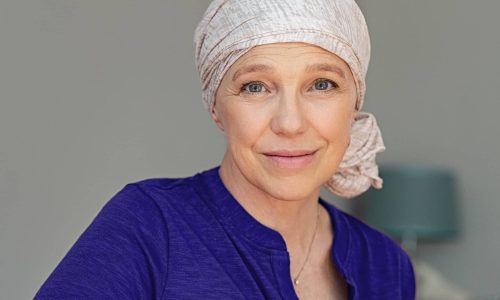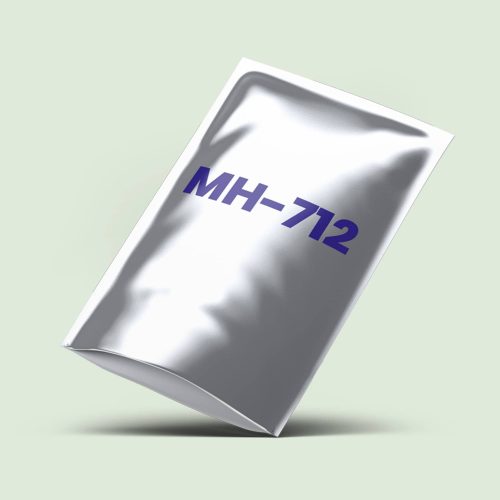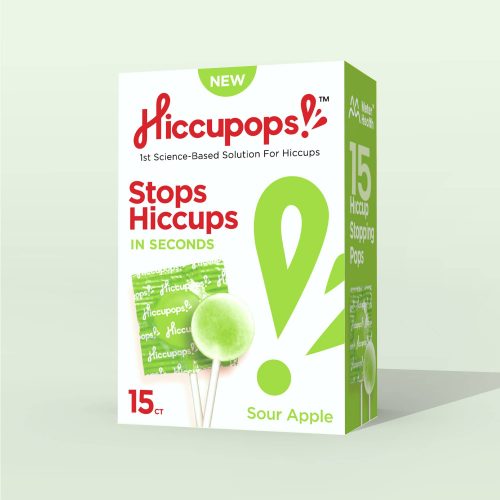Feeling powerless? You’re not alone.
Medical complication
Hiccups are a debilitating side effect of cancer and chemotherapy treatments. Sixteen percent of all chemo patients experience clinically significant hiccups2—in the U.S. alone, this represents about half a million patients annually.4 Beyond oncology, conditions and treatments associated with this type of hiccups include GERD, Parkinson’s disease, stroke, anesthesia and more—in total, hiccups have been reported alongside more than 130 medical conditions.5 6

No standard of care
In attempts to treat clinically significant hiccups, physicians have had to resort to trial and error, prescribing any of 29 different prescription drugs, including Baclofen and Reglan. For many, these treatments pose too great a risk or come with side effects so severe their continued usage can’t be tolerated.6 7 Additionally, a large number of off-label treatments used have no clinical data generated through controlled and properly powered clinical trials.6 7


From broken ribs and ruptured sutures to panic attacks and depression, some patients experience clinically significant hiccups that are considered highly problematic—because they interfere with quality of life.
What are hiccups?
Hiccups are episodes in which a secondary breathing pattern becomes interspersed with normal (eupneic) breathing patterns. Hiccups are regulated in the lower brainstem, where the central pattern generator for respiration is located.
Christian Straus, MD, and colleagues have speculated that the hiccup breathing pattern represents a form of gill breathing, an evolutionary carryover from our amphibious ancestors.9 Normally, the respiratory central pattern generator suppresses this archaic breathing pattern in favor of eupneic patterns, which are most efficient for mammals. However, this control system may be disrupted by physiologic disturbances affecting nerves of the mouth, throat, abdomen, or thorax, and the resultant aberrant signaling to the respiratory central pattern generator.8
Such disturbances could include coughing when drinking beer or soda, or the effects of steroids given to manage nausea and vomiting in patients with cancer. The “hiccup breathing pattern” is associated with rapid, uncontrollable diaphragmatic and thoracic muscle contractions. And as a result, air rushes into the lungs. As the diaphragm contracts, the glottis, a flap of cartilage at the back of the throat, closes tightly. The rush of incoming air hits the glottis, causing the “hic” sound that characterizes hiccups. Hiccups are a quasi-stable state. As such, they can be maintained for extended periods of time if no stimuli prompt reinstitution of eupneic breathing.8

Inspired by patients
We’re a biotech company. In fact, we’re the only company dedicated to researching hiccups. When we founded Meter Health in 2017, we made it our mission to build awareness, advance science, and deliver the best solutions for the full spectrum of hiccups.

Driven by science
While hiccups may come and go for some, for others, they’re unrelenting and negatively impact quality of life. That’s why we’ve spent years developing, testing, and perfecting our programs for both occasional and chronic hiccups.

Not all hiccups have the same impact. That’s why we’re advancing multiple options in oncology, consumer health, and more.
Clinically significant
![]() Can result from medical conditions or drug treatments but can last for any period of time
Can result from medical conditions or drug treatments but can last for any period of time
![]() Chronic hiccups lasting longer than 48 hours
Chronic hiccups lasting longer than 48 hours
![]() Solutions require FDA approval
Solutions require FDA approval
Occasional
![]() No connection to underlying medical conditions or drug treatments
No connection to underlying medical conditions or drug treatments
![]() Hiccups lasting less than 48 hours
Hiccups lasting less than 48 hours
![]() FDA approval not required
FDA approval not required
89% of physicians say they would use a safe, effective, and affordable new therapy in their practices1
Our scientific solutions

MH-712
Our new approach to advancing treatment options for chronic and clinically significant hiccups
In conjunction with Dr. Aminah Jatoi of Mayo Clinic, we’ve published on the consequences of clinically significant hiccups. And based on our ground-breaking understanding of the physiology of the hiccups, we’re taking a new approach to advance treatment. MH-712 is our investigational new drug program targeting oncology-incident clinically significant hiccups (e.g., alongside dexamethasone and cisplatin). The first clinical milestones are planned for Q2 2022. Reach out to us to learn more about MH-712.

Hiccupops
Stop hiccups in seconds with the first science-based solution for occasional hiccups
Hiccups have troubled people for eons. After years of research and development, we created Hiccupops to bring relief to occasional hiccup sufferers everywhere. These unique lollipops are designed to outsmart the body’s hiccup response with ingredients that reset the hiccup reflex and return breathing to normal—in seconds! Hiccupops have even been featured on CBS News and in The New York Times.
For those suffering from clinically significant hiccups, side effects can greatly affect quality of life—and even be deadly
![]()
Andrea*
Recently had surgery and anesthesia
While her hiccups lasted only five minutes, they became life-threatening when they nearly ruptured her sutures, causing intense pain.
![]()
Phillip*
Stage IV lung cancer patient undergoing chemotherapy
Lasting for weeks on end, his hiccups are making it difficult to eat, drink, or sleep properly. They’re extremely painful and harm both his mental and physical health.
![]()
John*
Has suffered intractable hiccups for the past 10 years
John’s hiccups have lasted all day, every day. His hiccups prevent him from socializing and sleeping, and doctors are unable to help despite the enormous impact on his quality of life.
*Names have been changed to protect patient identities.
Meet the Meter team

MJ Kievman
Founder and CEO
The patient-founder of Meter Health, MJ leads a team of world-class biotechnology executives while driving corporate strategy and fundraising activities. A patented inventor, she is also active in Meter’s scientific publications and clinical research.

Bartholomew Bacak, MD, PhD
Scientific Co-Founder
A leading researcher on hiccups and physician at University of Rochester (NY), Bart’s mathematical modeling work in a neuro-respiratory lab formed the basis for an advanced understanding of the underlying science and evolutionary nature of the hiccups.
Our scientific advisory board

Heidi L. Wagner, JD
Chief Operating Officer
Heidi’s leadership experience spans government affairs, advocacy, pricing and reimbursement, payer strategy, and patient advocacy. Her prior executive-level experience at Genentech, Alexion, and Global Blood Therapeutics is complemented by publicly traded board appointments.

Andrew Robinson, RPh
Executive VP Supply Chain
A pharmacist by training, Andrew left CVS Health in 2003 to start SpecialtyScripts, a specialty pharmacy. Andrew grew the company from a startup to having $250 million in annual sales and an exit to Cardinal Health and Walgreens.

Abraham Friedman
Director, Technical Operations
Abraham’s technical abilities span chemical engineering, theoretical mathematics, and machine learning. In more than a decade of industry experience at Alexion and AstraZeneca, Abraham has driven development and scale-up support of biologics manufacturing at clinical and commercial facilities.

Carol Lipshultz
Research Associate
An interdisciplinary thinker at heart, Carol’s research experiences are in the fields of chemistry, biology, writing, and philosophy. Prior to joining Meter Health, Carol conducted research in physical organic chemistry while at Colby College, and joined the Schnermann Chemical Biology Laboratory at the National Cancer Institute as a Postbaccalaureate Trainee.

Adam Kievman
Chairman
With 25 years of experience building leadership teams and scaling top biopharma and VC-backed biotech companies, Adam’s executive-level experience includes Alexion, Moderna, and Alnylam.

Robert Cooper, MBA
Chief Commercial Officer
A seasoned C-suite executive, Bob’s leadership, sales, and marketing experience crosses global consumer products (Hastens) to healthcare data and analytics (iQuest, Ceiba).

Michael Kane
Advisor
With more than 20 years experience as a senior marketing and sales executive, Michael has led consumer healthcare, pharmaceutical, and consumer products businesses across the globe. His background includes leading brands across multiple categories at Procter & Gamble, Novartis, and Bausch Health.

Abbey Jenkins
Advisor
Chief Commercial and Business Officer at Lyndra Therapeutics, Abbey leads top-performing commercial pharmaceutical organizations. Prior to Lyndra, Abbey led Emergent BioSolutions’ Vaccines Business Unit with achievements including the $270M acquisition of a global vaccine manufacturer and execution of the largest contract ($2B) in company history. She’s also held senior positions at Aquinox Pharmaceuticals, Relypsa, Actavis, Pfizer, and Medimmune.

Mary Pendergast
Advisor
Mary has more than 18 years’ experience at the US Food and Drug Administration (FDA) where she served as Commissioner and Senior Advisor to the FDA Commissioner and Associate Chief Counsel for Enforcement. In addition to the FDA, Mary was Executive Vice President of Government Affairs at Elan Corporation, founded her own consulting firm where she provided strategic advice to many top biopharmaceutical and device companies, and also served on the Board of Directors for AesRx, ARCH Foundation, and Impax Laboratories, Inc.

Patrick J. Coyne, MSN
Scientific Advisory Board Member
Patrick is a clinical nurse specialist, assistant professor, and director for palliative care at the Medical University of South Carolina in Charleston, SC. He developed and currently oversees an interdisciplinary team of healthcare professionals in providing palliative care, and has published more than 100 articles related to pain management, symptom control, and issues in end-stage disease.

David S. Craig, PharmD
Scientific Advisory Board Member
David is a clinical pharmacist specializing in pain management and palliative care at H. Lee Moffitt Cancer Center. His research and clinical work are driven by his passion to improve the way that pain and symptom management is delivered to patients.

Aminah Jatoi, MD
Scientific Advisory Board Member
Aminah is the Betty J. Foust MD and Parents’ Professor of Oncology at Mayo Clinic in Minnesota, where she primarily cares for patients with gastrointestinal and gynecological malignancies. Her research focuses on supportive care issues in cancer patients and she is the author of more than 300 publications.

Thomas LeBlanc, MD
Scientific Advisory Board Member
Thomas is a medical oncologist, palliative care physician, and patient experience researcher. As founding director of the Duke Cancer Patient Experience Research Program (CPEP), his research investigates common issues faced by people with cancer, including symptom burden, quality of life, psychological distress, prognostic understanding, and treatment decision making. His work aims to improve patients’ experiences living with serious illnesses.

Joseph Ma, PharmD
Scientific Advisory Board Member
Joseph is a pain and palliative care specialist at the Moores Cancer Center and is a professor of clinical pharmacy at UC San Diego, Skaggs School of Pharmacy and Pharmaceutical Sciences. His clinical practice is in pain and palliative care in an outpatient, multidisciplinary clinic, with research interests in examining methods that evaluate drug-drug interactions and pain medication variability in cancer patients.

Maryam Lustberg, MD, MPH
Scientific Advisory Board Member
Maryam is director of The Breast Center at Smilow Cancer Hospital and chief of breast medical oncology at Yale Cancer Center. She’s also an associate professor of medicine (medical oncology). Her research emphasizes improving the long-term outcomes for patients with breast cancer who have developed side effects associated with treatment.

Eric Roeland, MD, FAAHPM
Scientific Advisory Board Member
Eric is a medical oncologist and palliative care specialist at the Oregon Health and Science University, Knight Cancer Institute. His clinical practice focuses on caring for patients with melanoma and cancer who are participating in early phase clinical trials. His research focuses on symptom improvement, treatment tolerance, and quality of life of patients with symptomatic cancer.
Explore clinical research and news articles about the science of hiccups and the need for support

Perspectives on the Medical, Quality of Life, and Economic Consequences of Hiccups

Establishing the Groundwork for Clinical Trials With Hiccupops® for Hiccup Palliation

Dexamethasone and hiccups: a 2000-patient, telephone-based study
1. Sermo, Magnolia Market Research May 2019 (data on file)
2. Ehret, C., Young, C., Ellefson, C., Aase, L., & Jatoi, A. (2022). Frequency and Symptomatology of Hiccups in Patients With Cancer: Using an On-Line Medical Community to Better Understand the Patient Experience. American Journal Of Hospice And Palliative Medicine®, 39(2), 147-151. doi: 10.1177/10499091211006923
3. Jacqueline Howard, C. (2019). Top 10 health questions America asked Dr. Google in 2019. Retrieved March 13, 2022, from https://www.cnn.com/2019/12/12/health/health-questions-trending-google-2019-trnd/index.html
4. Per internal estimates (data on file)
5. Hendrix, K., Wilson, D., Kievman, M., & Jatoi, A. (2019). Perspectives on the Medical, Quality of Life, and Economic Consequences of Hiccups. Current Oncology Reports, 21(12). doi: 10.1007/s11912-019-0857-4
6. Kohse, E., Hollmann, M., Bardenheuer, H., & Kessler, J. (2017). Chronic Hiccups. Anesthesia & Analgesia, 125(4), 1169-1183. doi: 10.1213/ane.0000000000002289
7. Polito, N., & Fellows, S. (2017). Pharmacologic Interventions for Intractable and Persistent Hiccups: A Systematic Review. The Journal Of Emergency Medicine, 53(4), 540-549. doi: 10.1016/j.jemermed.2017.05.033
8. Bacak & Danner (manuscript in preparation)
9. Straus, C., Vasilakos, K., Wilson, R., Oshima, T., Zelter, M., & Derenne, J. et al. (2003). A phylogenetic hypothesis for the origin of hiccough. Bioessays, 25(2), 182-188. doi: 10.1002/bies.10224
10. Per internal estimates (data on file)
Get in touch with Meter Health
To keep up with news from Meter Health, subscribe to our mailing list:
*All fields required













